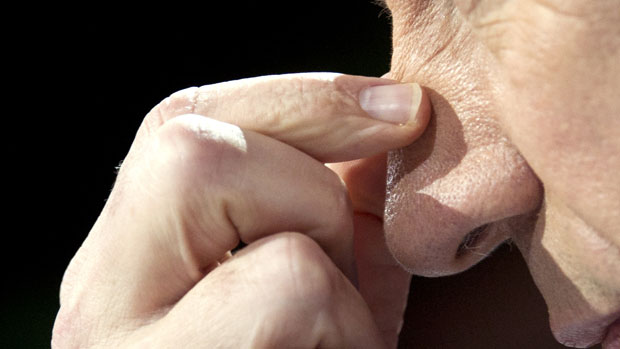Barista hospitalised after holding in farts for two years
And other stories from the stranger side of life

A free daily email with the biggest news stories of the day – and the best features from TheWeek.com
You are now subscribed
Your newsletter sign-up was successful
An Irish barista was hospitalised because she refused to fart around her boyfriend for two years. Cara Clarke was at work last week when she developed “extreme stomach pain” and was rushed to hospital. The 19-year-old was told she had an infection and would have to have her appendix removed before it burst, reported The Irish Mirror. She said the infection was caused by her reluctance to break wind around her partner and vowed to “let it out from now on”. In January, an influencer was hospitalised for the opposite reason: farting too much.
Mushrooms ‘talk to one another’
A professor has found that mushrooms talk to one another, reported The Guardian. Mathematical analysis of the electrical signals fungi send to each other has identified patterns that have a strong resemblance to human speech, said Professor Andrew Adamatzky at the University of the West of England. But Dan Bebber, an associate professor of biosciences at the University of Exeter, said the theory is “overenthusiastic” and there needs to be “far more research and testing of critical hypotheses before we see ‘Fungus’ on Google Translate”.
The Week
Escape your echo chamber. Get the facts behind the news, plus analysis from multiple perspectives.

Sign up for The Week's Free Newsletters
From our morning news briefing to a weekly Good News Newsletter, get the best of The Week delivered directly to your inbox.
From our morning news briefing to a weekly Good News Newsletter, get the best of The Week delivered directly to your inbox.
Dogs manipulate us with facial muscles
Dogs have mastered facial expressions to manipulate us, according to new research. A study at the Duquesne University in Pittsburgh found that there are several differences in the facial muscles of dogs and wolves. The research suggests the eyes of dogs have in effect been humanised, explained The Times. “They’re communicating with us and are able to make facial expressions just like us,” said Anne Burrows, the author of the study. “They want to grab our attention with a facial expression.”
A free daily email with the biggest news stories of the day – and the best features from TheWeek.com
-
 The ‘ravenous’ demand for Cornish minerals
The ‘ravenous’ demand for Cornish mineralsUnder the Radar Growing need for critical minerals to power tech has intensified ‘appetite’ for lithium, which could be a ‘huge boon’ for local economy
-
 Why are election experts taking Trump’s midterm threats seriously?
Why are election experts taking Trump’s midterm threats seriously?IN THE SPOTLIGHT As the president muses about polling place deployments and a centralized electoral system aimed at one-party control, lawmakers are taking this administration at its word
-
 ‘Restaurateurs have become millionaires’
‘Restaurateurs have become millionaires’Instant Opinion Opinion, comment and editorials of the day
-
 Epstein files topple law CEO, roil UK government
Epstein files topple law CEO, roil UK governmentSpeed Read Peter Mandelson, Britain’s former ambassador to the US, is caught up in the scandal
-
 Iran and US prepare to meet after skirmishes
Iran and US prepare to meet after skirmishesSpeed Read The incident comes amid heightened tensions in the Middle East
-
 Israel retrieves final hostage’s body from Gaza
Israel retrieves final hostage’s body from GazaSpeed Read The 24-year-old police officer was killed during the initial Hamas attack
-
 China’s Xi targets top general in growing purge
China’s Xi targets top general in growing purgeSpeed Read Zhang Youxia is being investigated over ‘grave violations’ of the law
-
 Panama and Canada are negotiating over a crucial copper mine
Panama and Canada are negotiating over a crucial copper mineIn the Spotlight Panama is set to make a final decision on the mine this summer
-
 Why Greenland’s natural resources are nearly impossible to mine
Why Greenland’s natural resources are nearly impossible to mineThe Explainer The country’s natural landscape makes the task extremely difficult
-
 Iran cuts internet as protests escalate
Iran cuts internet as protests escalateSpeed Reada Government buildings across the country have been set on fire
-
 US nabs ‘shadow’ tanker claimed by Russia
US nabs ‘shadow’ tanker claimed by RussiaSpeed Read The ship was one of two vessels seized by the US military